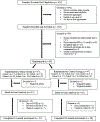The effects of a music enrichment program on parent-infant interactions during mealtime: A randomized controlled trial
- PMID: 37148975
- PMCID: PMC10401892
- DOI: 10.1016/j.appet.2023.106590
The effects of a music enrichment program on parent-infant interactions during mealtime: A randomized controlled trial
Abstract
Background: Parent-child interactions are linked to childhood obesity. Music enrichment programs enhance parent-child interactions and may be a strategy for early childhood obesity prevention.
Objective: We implemented a 2-year randomized, controlled trial to assess the effects of a music enrichment program (music, n = 45) vs. active play date control (control, n = 45) on parent-child interactional quality and infant weight status.
Methods: Typically developing infants aged 9-to 15-months were enrolled with a primary caregiver in the Music Together ® or a play date program. Participants attended once per week group meetings for 12 months and once per month group meetings for an additional 12 months. Parent-child interaction was measured using the Parent Child Early Relational Assessment (PCERA) at baseline, month 6, 12, and 24. We used a modified intent-to-treat mixed model regression to test group differences in parent-child interactions and Weight for length z-score (zWFL) growth trajectories were modeled.
Results: There were significant differential group changes across time for negative affect during feeding (group*month; p = 0.02) in that those parents in the music group significantly decreased their negative affect score compared with the control group from baseline to month 12 (music change = -0.279 ± 0.129; control change = +0.254 ± 0.131.; p = 0.00). Additionally, we also observed significant differential group changes across time for parent intrusiveness during feeding (group*month; p = 0.04) in that those parents in the music group significantly decreased their intrusiveness score compared with the control group from month 6 to month 12 (music change = -0.209 ± 0.121; control change = 0.326 ± 0.141; p = 0.01). We did not find a significant association between any of the changes in parental negative affect and intrusiveness with child zWFL trajectories.
Conclusion: Participating in a music enrichment program from an early age may promote positive parent-child interactions during feeding, although this improvement in the quality of parent-child interactions during feeding was not associated with weight gain trajectories.
Keywords: Enriched environment; Infant obesity; Music; Parenting.
Copyright © 2023 Elsevier Ltd. All rights reserved.
Conflict of interest statement
Declaration of competing interest All authors declare no conflict of interest.
Figures



Similar articles
-
The impact of a community-based music program during infancy on the quality of parent-child language interactions.Child Dev. 2024 Mar-Apr;95(2):481-496. doi: 10.1111/cdev.14005. Epub 2023 Sep 28. Child Dev. 2024. PMID: 37767574 Free PMC article.
-
Reducing relative food reinforcement of infants using a music enrichment program: a randomized, controlled trial.Am J Clin Nutr. 2022 Dec 19;116(6):1642-1653. doi: 10.1093/ajcn/nqac209. Am J Clin Nutr. 2022. PMID: 36250608 Free PMC article. Clinical Trial.
-
Parenting support to prevent overweight during regular well-child visits in 0-3 year old children (BBOFT+ program), a cluster randomized trial on the effectiveness on child BMI and health behaviors and parenting.PLoS One. 2020 Aug 18;15(8):e0237564. doi: 10.1371/journal.pone.0237564. eCollection 2020. PLoS One. 2020. PMID: 32810194 Free PMC article. Clinical Trial.
-
An Internet-Based Childhood Obesity Prevention Program (Time2bHealthy) for Parents of Preschool-Aged Children: Randomized Controlled Trial.J Med Internet Res. 2019 Feb 8;21(2):e11964. doi: 10.2196/11964. J Med Internet Res. 2019. PMID: 30735139 Free PMC article. Clinical Trial.
-
Parent-Child Interaction, Self-Regulation, and Obesity Prevention in Early Childhood.Curr Obes Rep. 2016 Jun;5(2):192-200. doi: 10.1007/s13679-016-0208-9. Curr Obes Rep. 2016. PMID: 27037572 Free PMC article. Review.
Cited by
-
The impact of a community-based music program during infancy on the quality of parent-child language interactions.Child Dev. 2024 Mar-Apr;95(2):481-496. doi: 10.1111/cdev.14005. Epub 2023 Sep 28. Child Dev. 2024. PMID: 37767574 Free PMC article.
References
-
- Hollenstein T, Tighe AB, Lougheed JP. Emotional development in the context of mother–child relationships. Current opinion in psychology. 2017;17:140–144. - PubMed
Publication types
MeSH terms
Grants and funding
LinkOut - more resources
Full Text Sources
Medical

